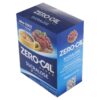Description
Okay, here’s an article about aspartame, aiming for a balance of information and accessibility:
Aspartame: Sweetness, Controversy, and What You Need to Know
Aspartame. It’s a name you’ve likely seen on the ingredient list of your favorite diet soda, sugar-free gum, or even some yogurt. It’s a widely used artificial sweetener, celebrated for its intense sweetness with minimal calories. But aspartame also carries a significant amount of controversy, with questions swirling around its safety and long-term effects. So, what’s the real story?
What is Aspartame?
Aspartame is a low-calorie artificial sweetener discovered in 1965 by chemist James Schlatter. It’s created by combining two amino acids: aspartic acid and phenylalanine. These amino acids naturally occur in many foods, including meat, grains, and dairy products. Aspartame is approximately 200 times sweeter than sucrose (table sugar), meaning only a tiny amount is needed to achieve the desired sweet taste.
Why Use Aspartame?
The main appeal of aspartame is its ability to provide sweetness without the calories. This makes it a popular choice in:
- Diet Products: Beverages, desserts, and other foods marketed as “sugar-free,” “diet,” or “light” often use aspartame as a sugar substitute.
- Weight Management: For individuals looking to reduce their sugar intake and manage their weight, aspartame-sweetened products can be an alternative.
- Diabetes Management: People with diabetes can use aspartame-sweetened foods and drinks as a way to enjoy sweet tastes without significantly impacting blood sugar levels.
The Controversy: Safety Concerns and Scientific Research
Since its approval for use in the 1980s, aspartame has been the subject of numerous studies and a considerable amount of debate. Some of the concerns raised include:
- Headaches and Migraines: Some individuals report experiencing headaches or migraines after consuming aspartame. While anecdotal evidence exists, scientific studies have yielded mixed results, and a definitive link remains controversial.
- Neurological Effects: Concerns have been raised about potential neurological effects, including anxiety, depression, and cognitive impairment. Extensive research has largely failed to establish a causal relationship between aspartame consumption and these conditions within acceptable intake levels.
- Cancer Risk: Early studies raised concerns about a potential link between aspartame and cancer. However, major regulatory agencies, including the Food and Drug Administration (FDA) and the European Food Safety Authority (EFSA), have reviewed these studies and concluded that aspartame is safe for consumption at currently approved levels.
- Phenylketonuria (PKU): Individuals with PKU, a rare genetic disorder, must avoid aspartame. Their bodies cannot properly process phenylalanine, one of the amino acids in aspartame. Products containing aspartame must carry a warning label for those with PKU.
Regulatory Approval and Acceptable Daily Intake (ADI)
Aspartame has been approved for use by numerous regulatory bodies worldwide, including the FDA, EFSA, and the World Health Organization (WHO). These agencies have established an Acceptable Daily Intake (ADI), which is the amount of aspartame considered safe to consume daily over a lifetime without any adverse health effects.
- FDA ADI: 50 milligrams per kilogram of body weight per day.
- EFSA ADI: 40 milligrams per kilogram of body weight per day.
To put this into perspective, a person weighing 150 pounds (approximately 68 kilograms) could consume roughly 2720 milligrams of aspartame per day under the EFSA guidelines. This is equivalent to drinking more than a dozen cans of diet soda sweetened solely with aspartame.
The Bottom Line: Moderation and Informed Choices
The scientific consensus, based on extensive research and reviews by regulatory agencies, indicates that aspartame is safe for most people when consumed within the recommended ADI. However, like any food additive, individual sensitivities can vary.
Here are some key takeaways:
- Moderation is Key: Even though aspartame is considered safe at approved levels, it’s always wise to consume it in moderation as part of a balanced diet.
- Listen to Your Body: If you suspect that aspartame is causing you adverse effects, consider reducing or eliminating your intake and consulting with a healthcare professional.
- Read Labels Carefully: Be aware of the products you’re consuming and check the ingredient lists for aspartame.
- Make Informed Choices: Consider your own individual needs and health concerns when deciding whether or not to consume aspartame-sweetened products. There are other alternative sweeteners available, such as stevia, monk fruit, or erythritol, which you may want to explore.
Ultimately, the decision of whether or not to consume aspartame is a personal one. By understanding the facts and considering your own individual circumstances, you can make an informed choice that is right for you.



















Reviews
There are no reviews yet.